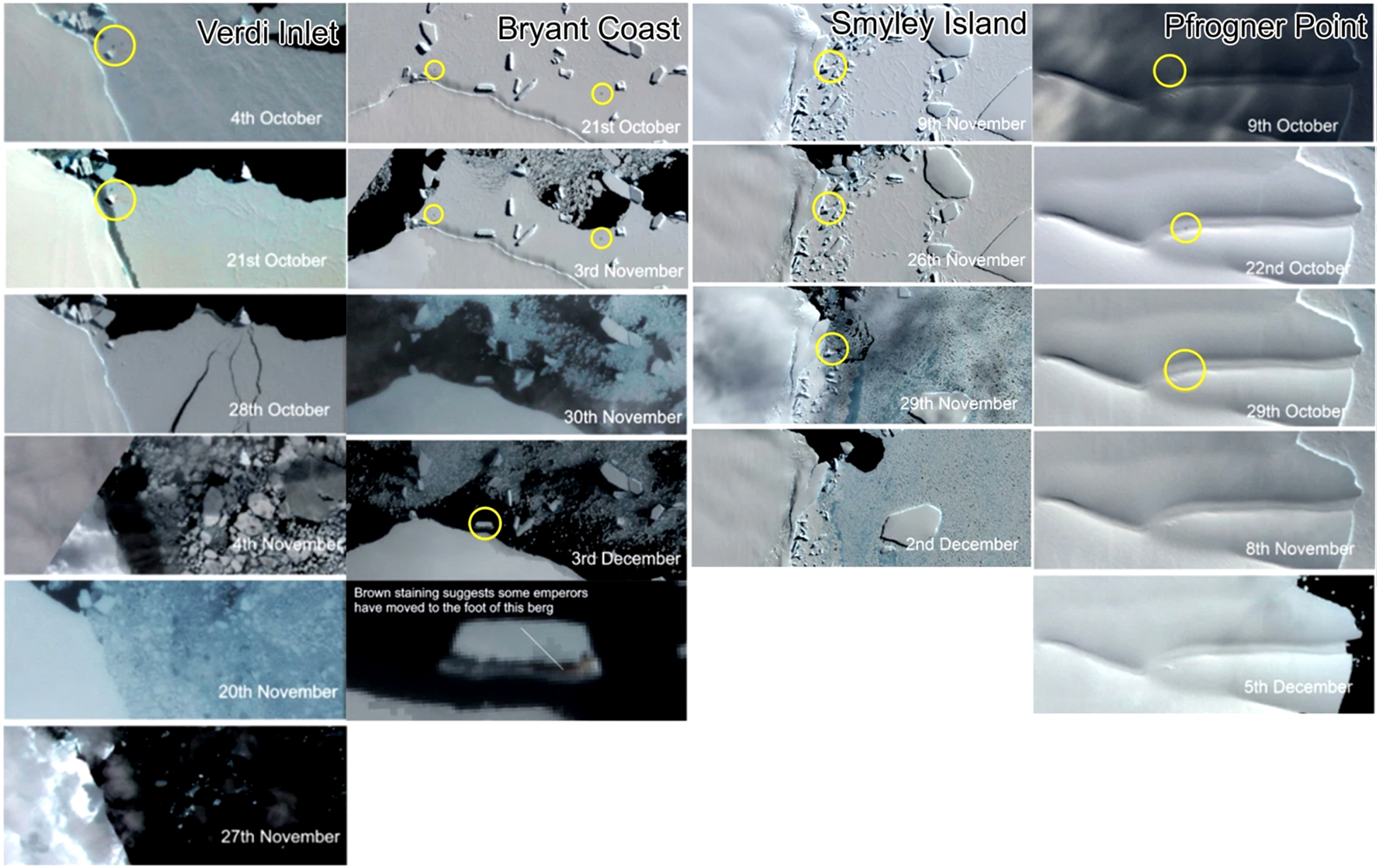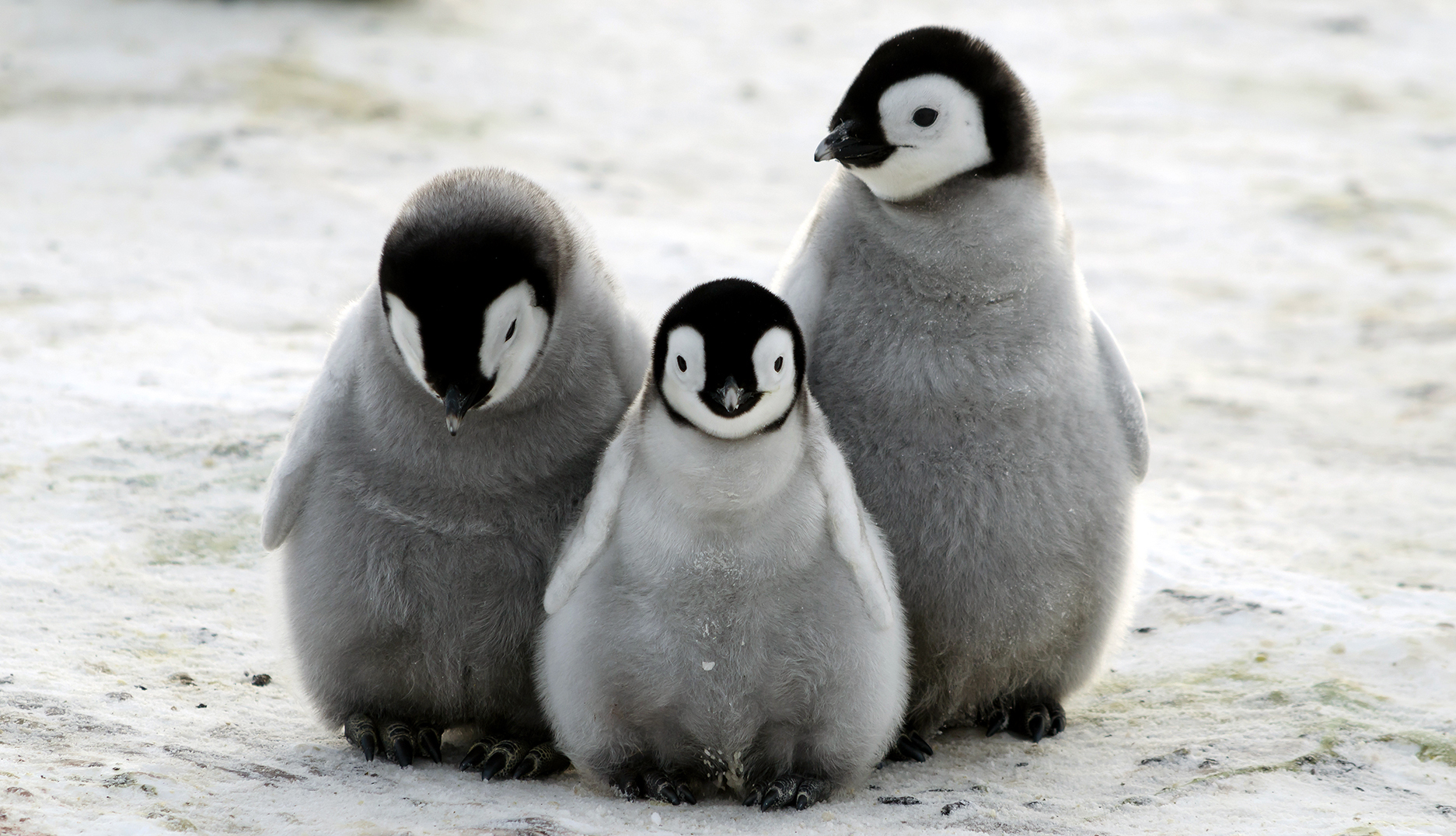Emperor penguin colonies in the central and eastern Bellingshausen Sea of West Antarctica experienced catastrophic breeding failure in the summer of 2022 as a result of record ice lows.
In a new study published in Communications Earth & Environment, British Antarctic Survey (BAS) scientists report a significant likelihood that chicks in four out of five colonies in the region died off.
This incident, confirmed by satellite images, represents the first-known mass breeding failure linked to substantial sea-ice shrinkage.
“We have never seen emperor penguins fail to breed, at this scale, in a single season,” said Dr Peter Fretwell, lead author of the study and a world authority at tracking penguin movements. “The loss of sea ice in this region during the Antarctic summer made it very unlikely that displaced chicks would survive.”
More than 9,000 chicks are thought to have perished, said the BAS.
Doing the autopsy: timeline of a tragedy
The world’s largest penguin at about a metre tall, the flightless emperor penguin relies on stable sea ice from April to January for various life stages, including breeding, moulting and foraging.
In May and June, a single egg per season is laid by an emperor mother, hatching after about 65 days.
However, in the southern spring of 2022, West Antarctica saw historic ice lows. Those lows persisted for the rest of the year.
Locations of emepror penguin colonies affected by early sea ice loss in 2022, overlain on the December 2022 sea ice anomaly. pic.twitter.com/z3LnonC7Lg
— Peter T Fretwell (@PeterTFretwell) August 29, 2023
In November, certain areas within the Bellingshausen Sea region experienced a 100% loss of sea ice.
In the December and January period, the chicks had been due to fledge, but several colonies had been abandoned.
As revealed by the satellite images, there were smoking guns: the amount of sea ice was equal to 2021’s historic low, and brown guano stains — tell-tale signs of penguin activity — had disappeared from broken-up pack ice.
Unable to develop waterproof feathers in time for independent survival in the harsh conditions, the chicks likely died by drowning or freezing.
What is destroying the sea ice?
According to the authors, the vanishing was probably caused by the Triple-Dip La Niña leading to a “strongly negative” Southern Annular Mode (SAM), which means there could be some good news: when these phenomena dissipate, the ice may regrow.
Yet, in the Antarctic, climate change never seems too far from the crime scene.
While the intensely studied links between human warming and melting ice are not yet conclusive, studies have shown that emperors are also vulnerable to ice loss caused by climate change.
https://www.youtube.com/watch?v=IUGoDUrD3c0
“We’ll need years of targeted observations and modelling to know precisely how much the current conditions are being influenced by these phenomena and by natural ocean variability,” cautions Dr Caroline Holmes, a BAS polar climate scientist. But “tumbling sea ice records” and rising ocean temperatures “strongly” indicate that climate change is fuelling extreme events, she said.
Adding fuel to that fire, Antarctica has experienced its four lowest sea-ice seasons since 2016.
“Evidence suggests that extreme sea ice loss events like this will become more frequent and widespread,” said Fretwell, the study lead author.
If anything, the link between strange ice and breeding failures heighten the need to urgently study Antarctic climate shifts. This is especially true for emperors, which are threatened by a transforming climate more than any other factor, according to the study.
What this means for the future of emperor penguins
Emperor penguins are an iconic emblem of Antarctica’s identity, and they could virtually disappear by 2100 due to sea-ice loss, other scientists also report.
And when there are unusual drops in sea ice and chicks do not fledge, it is a warning of what might happen more often.
Emperors can adapt by moving colonies, but such strategies run out of options if the habitat becomes unsuitable across a region.
The persistence of “refugia” — such as bergs that may act as ice stabilisers — could, to some extent, also help penguins adapt.
But an iceberg does not an ice sheet make, and the study suggests that, if warming rates persist, most colonies could be in a very critical and endangered state by the end of the century, with only a few struggling to survive.
‘Politicians must act’
“This paper dramatically reveals the connection between sea ice loss and ecosystem annihilation,” said Dr Jeremy Wilkinson, a BAS sea ice physicist. “Politicians must act to minimise the impact of climate change. There is no time left.”
If that is true, not every state signed up to the Antarctic Treaty, the agreement that devotes Antarctica to demilitarisation and conservation aims, seems worried.
 Satellite imagery from the four colonies in 2022 showing sea-ice changes through the créching and fledging season. (Image: Fretwell, PT; Boutet, A; Ratcliffe, N. Commun Earth Environ 4, 273 — 2023)
Satellite imagery from the four colonies in 2022 showing sea-ice changes through the créching and fledging season. (Image: Fretwell, PT; Boutet, A; Ratcliffe, N. Commun Earth Environ 4, 273 — 2023)
As this study also suggests, progress was stymied by absurd developments at a recent Antarctic Treaty Consultative Meeting (ATCM).
Daily Maverick revealed that, at the 2022 Berlin ATCM, a Chinese delegation cited non-data from a polar bear blog as a key reason for blocking an emperor rescue plan.
The plan was supported by the other 28 decision-making states, but the Chinese delegation said threats to polar bears and penguins were overstated, even though peer-reviewed data suggests otherwise.
The blog lacked peer review. And, apart from the other obvious differences between polar bears and penguins, the oddness of the Chinese hypothesis was compounded by the fact that the species are native to opposite ends of the Earth. This has led some scholars to suggest potential political motives behind quoting non-data to block widely supported initiatives.
Responses to our detailed questions were not received.
Thanks @PeterTFretwell for an excellent and extremely eye-opening talk at today's GRI Seminar. I'm sure those who had the privilege to see it, were both shocked and fascinated by the incredible results of your research. [link to a recording of the talk will follow] pic.twitter.com/FGe19TimJk
— Geospatial Research Institute (GRI) | Toi Hangarau (@GeospatialNZ) August 31, 2023
Germany’s host foreign ministry said a UK-led effort, supported by individual states, would go ahead regardless.
“An overwhelming majority of parties held the opinion that there is sufficient scientific evidence for the species to be put under special protection,” the ministry said. “While a formal decision on special protection status was blocked by one party, most parties indicated that they would nonetheless implement the draft action plan … on a national basis.” DM
https://www.youtube.com/watch?v=REeWvTRUpMk




 Satellite imagery from the four colonies in 2022 showing sea-ice changes through the créching and fledging season.
(Image: Fretwell, PT; Boutet, A; Ratcliffe, N. Commun Earth Environ 4, 273 — 2023.)
Satellite imagery from the four colonies in 2022 showing sea-ice changes through the créching and fledging season.
(Image: Fretwell, PT; Boutet, A; Ratcliffe, N. Commun Earth Environ 4, 273 — 2023.)